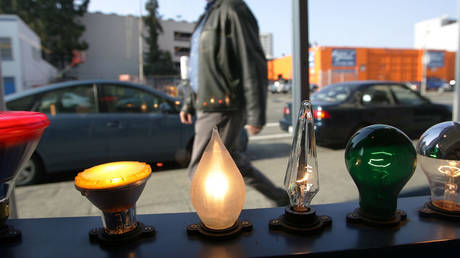US bans incandescent light bulbs
Americans can no longer purchase lightbulbs rated below 45 lumens, effectively prohibiting non-LED bulbs

Purchasing or manufacturing energy-inefficient bulbs is illegal under legislation which takes effect Tuesday
Buying and manufacturing incandescent light bulbs has been outlawed in the US as of Tuesday, under controversial legislation which the Biden administration says is aimed at saving money and the environment.
The new rule raises the minimum efficiency level for “general service lamps,” meaning light bulbs screwed into lamps and ceiling fixtures, prohibiting those that produce under 45 lumens of light per watt of power. Traditional incandescent bulbs produce just 15 lumens per watt, according to manufacturer Philips.
While defenders of the measure argue it does not mandate the use of LED bulbs and leaves room for incandescent manufacturers to simply increase the efficiency of their product, critics call that unrealistic. Residential bulb use appears to be the main target of the rule, as it does not affect the manufacture or sale of incandescent lights used in traffic signals, floodlights, showcase lamps, appliance lights, and other specialty purposes.
The new standards were formulated in 2007 and initially planned for 2020 before they were sidelined by then president Donald Trump. They were finalized by the Department of Energy last April. While it is still legal to own the bulbs, those who continue to make or sell them can be fined as much as $542 per bulb.
LED lightbulbs last 25 to 50 times as long as the incandescent variety and use 75% less electricity, according to the energy department. The Natural Resources Defense Council is less enthusiastic, claiming they use one sixth the energy of incandescent bulbs and last at least 10 times longer.
Due to the efficiency of LED, the Department of Energy claims switching will save families $100 per year, though the bulbs themselves are on average $3 to $4 more expensive than their less-efficient cousins. Nationwide, this translates to savings of $3 billion annually – and will reduce carbon emissions over the next 30 years by 222 million metric tons, according to the agency.
Critics of the Biden administration have accused it of waging a war on personal choice, highlighting the bulb ban and a proposed ban on gas stoves as unconstitutional restrictions on consumer freedom.
The energy department has not only come up with new standards for stoves, but washing machines, refrigerators, dishwashers, water heaters, and air conditioners in recent months, with still more rules reportedly planned for furnaces, pool equipment, ceiling fans, battery chargers, and dehumidifiers.
In December, the department announced plans to increase minimum bulb efficiency still further, to 120 lumens per watt, sending compact fluorescent bulbs to the junk heap.






















